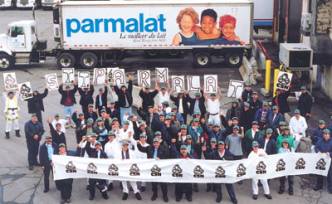
back

|

|

A U.S. Component Is Added to an Italian Scandal
By Mary Williams Walsh, The New York Times
December 30, 2003
The Securities and Exchange Commission sued Parmalat yesterday, saying the company, the Italian dairy and food giant, induced investors in the United States to buy more than $1.5 billion worth of bonds and other securities while engaging in "one of the largest and most brazen corporate financial frauds in history."
Parmalat was declared insolvent by a court in Parma, Italy, on Saturday, about a week after it acknowledged that it had overstated the assets in its 2002 financial reports by about $4.9 billion. Its founder and former chairman, Calisto Tanzi, was arrested on Sunday and questioned by Italian investigators who are trying to piece together what went wrong at the company.
So far, executives of the company have told Italian investigators about a network of offshore companies that were used to make Parmalat look as if it had assets that did not exist. There are signs of fraud as early as 1989, when the company began trading on the Milan exchange, according to Italian investigators.
In its complaint, the S.E.C. said that Mr. Tanzi and other top Parmalat managers and directors actively promoted the company's bonds in the United States from 1998 to 2002 by holding "numerous road shows" as well as holding meetings for United States investors at the company's headquarters in Italy. The complaint said the company's chief financial officer, Fausto Tonna, also participated.
In addition, Parmalat sponsored a private offering of its American depository receipts in 1996. Such receipts are an investment vehicle representing a specific amount of the foreign company's stock, which is held on deposit at a bank. Parmalat sponsored its American depository receipt program at Citibank. Since their initial placement, the receipts have traded over the counter.
This fall, the complaint said, Parmalat fraudulently offered $100 million of unsecured notes to American investors by attempting to sell them at a time when its financial statements were overstating the company's assets, making it look stronger than it really was. Parmalat had described cash holdings in an offshore subsidiary and claimed to have used "excess cash balances" to buy back $3.6 billion of corporate debt, the S.E.C. said.
The complaint said that, in fact, the money did not exist and the debt was still outstanding.
The $100 million note offering ultimately failed because Parmalat's financial problems came to light.
The S.E.C. said that Mr. Tanzi and his son, Stefano Tanzi - also a senior Parmalat executive - met earlier this month with executives of a New York-based private equity firm to discuss a possible leveraged buyout. When one of the Tanzis made a remark about the company's liquidity problems, one of the firm's representatives pointed out that the company's financial statements showed large amounts of cash.
"In response, Stefano Tanzi stated that the cash was not there," the complaint said.
At that point, Luciano del Soldato, Parmalat's chief financial officer at the time, was called into the meeting, the
S.E.C. said. He disclosed that the company's audited balance sheet was incorrect, falsely showing about $3.6 billion of outstanding bonds as having been repurchased, among other misstatements.
After further discussions, the New York private equity firm said that it would not handle the leveraged buyout unless Parmalat corrected the false information publicly.
"When it became clear that the Tanzis were unwilling to do so, the New York firm's representatives terminated their discussions," the complaint said.
The S.E.C. did not identify the private equity firm.
The complaint, filed in United States District Court in Manhattan, is seeking monetary penalties but did not specify an amount.
Copyright © 2002
Global Action on Aging
Terms of
Use | Privacy
Policy | Contact Us
|

